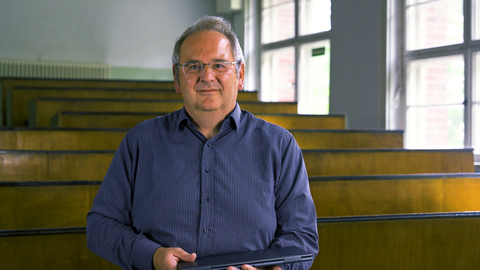Jan 21, 2025
Metal-free magnetism: Reinhart Koselleck project for Prof. Thomas Heine
Thomas Heine, Professor of Theoretical Chemistry at Dresden University of Technology, has received the prestigious Reinhart Koselleck project funding from the German Research Foundation (DFG) for his research into metal-free magnetic materials. With a total of 915,000 euros, Heine will receive sufficient funding over the next five years to use this innovative project at Dresden University of Technology to provide impetus for the electronics of the future, particularly for quantum computers.
Both the movement of electrons on orbits around atomic nuclei and the intrinsic spin of electrons generate magnetic moments. In most materials, electrons occur in pairs with opposing spins, so that their magnetic moments mutually cancel each other out. When unpaired electrons occur, the magnetic moments can couple and reinforce each other, leading to a so-called magnetic order and to strong and permanent magnetic properties. This is found, for example, in iron, nickel, cobalt and neodymium. This phenomenon is known as ferromagnetism. Permanent magnets are based on that ferromagnetism, as are magnetic data storage devices such as floppy disks or magnetic tapes, which are no longer in use.
Magnetic order has not yet been observed with absolute certainty in metal-free materials. However, metal-free magnets would be extremely promising in terms of their application in various technologies: In metals, the so-called spin-orbit coupling influences the magnetic order and leads to spin-polarized states not being stable, which is a major problem for quantum computers in particular. In metal-free systems, the spin-orbit coupling is negligible, which makes complex quantum computers with many so-called qubits possible.
Only recently, Thomas Heine and his team at the Chair of Theoretical Chemistry at Dresden University of Technology and the Center for Advanced Systems Understanding CASUS in Görlitz presented a way of realizing metal-free magnetism for the first time. Instead of metal atoms, radical organic molecules are used as carriers of the magnetic moments. One such radical molecule is triangulene, which was predicted by Erich Clar at Dresden University of Technology in 1953 and synthesized for the first time in 2017. When triangulene molecules are combined to form a two-dimensional lattice, not only do the magnetic moments remain intact, they also couple to create a stable magnetic state. The prediction of these metal-free magnetic materials is based on precise computer simulations. “Motivated by our theoretical results, we want to be the first group to realize metal-free systems with strong magnetic order at room temperature and beyond. In addition to the obvious applications in information technology, this will even open up metal-free motors and generators,” says Thomas Heine, explaining his vision.
The Koselleck project, entitled “Long-range magnetic order in metal-free materials”, has a clear objective: to understand and demonstrate how metal-free materials with strong magnetism can be designed and produced. To this end, precise calculations are carried out on supercomputers, but fundamental work will also be necessary. Furthermore, possible chemical synthesis routes will be researched, which will enable partners with experimental expertise to synthesize these materials. The focus here is on materials that consist almost exclusively of carbon.
“This work is made possible by the unique expertise that has been developed in my group over the last few years. There are only a few groups worldwide that have mastered a similarly rich portfolio of computational methods, ranging from sophisticated first-principles methods for state-of-the-art supercomputers to analytical calculations,” explains Heine.
However, despite the excellent methodological skills and broad expertise in advanced computational chemistry and materials science, the project still faces a number of challenges. Many established methods fail to correctly describe metal-free magnetism and need to be improved. If successfully realized, the project will have far-reaching implications beyond chemistry, particularly in information technology, but also in solid state physics and materials science.
About the Reinhart Koselleck Program
The Reinhart Koselleck Program enables outstanding researchers with a proven scientific track record to pursue exceptionally innovative, higher-risk projects. https://www.dfg.de/en/research-funding/funding-opportunities/programmes/individual/reinhart-koselleck-projects
Contact:
Prof. Dr. Thomas Heine
Chair of Theoretical Chemistry
Dresden University of Technology
Tel: +49 351 463-37637
E-mail:

